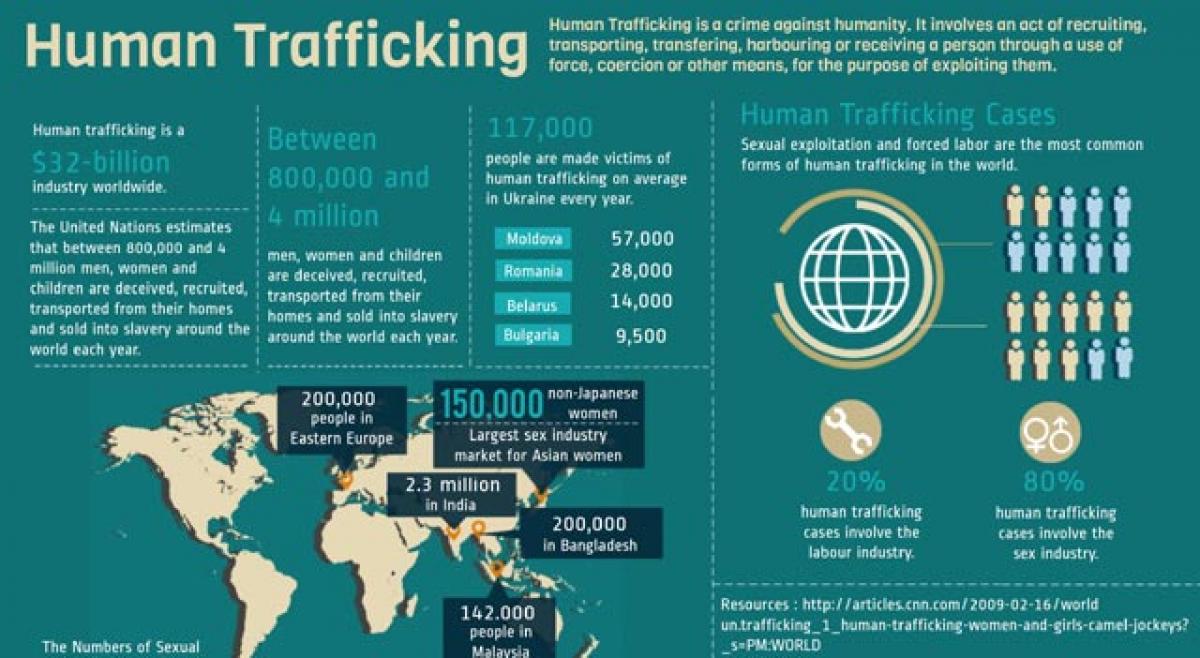Live
- IIFL Home Fin to raise Rs 500 cr
- Sensex, Nifty drift lower on profit booking
- Jagan treated cadres as ‘subordinates’, alleges Grandhi
- Mpower’s survey on edu loans
- IIP growth falls to 3.5% in Oct
- Easing food prices lower retail inflation to 5.48% in November
- Space allocation for packaging units at MSME parks on anvil
- Maha Kumbh: Yogi reviews preparations
- Gadkari on accidents: I try to hide my face in meetings abroad
- Abetment of suicide: Mere harassment not sufficient to find accused guilty says SC
Just In

South Asian nations will set up a toll-free helpline and online platform to fight human trafficking, one of the region’s biggest problems, and trace the thousands of children who go missing in the region annually.
South Asian nations will set up a toll-free helpline and online platform to fight human trafficking, one of the region’s biggest problems, and trace the thousands of children who go missing in the region annually. Ministers from India, Pakistan, Afghanistan, Bangladesh, Bhutan, Sri Lanka, the Maldives and Nepal came to the agreement after a conference on child protection held under the auspices of the South Asian Association for Regional Cooperation (SAARC).
South Asia, with India at its centre, is the fastest-growing and second-largest region for human trafficking in the world, after East Asia, according to the United Nations Office for Drugs and Crime. India’s women and child development ministry said delegates from the eight South Asian countries adopted a series of measures to boost cooperation to end child exploitation.
“(These include) regional cross sharing and programming on ICT initiatives to trace missing children, working towards establishing a uniform toll free helpline, developing a regional strategy and common standards for addressing all forms of sexual abuse, exploitation and trafficking,: it said in a statement. There are no accurate figures on the number of people being trafficked within South Asia, but activists say thousands of mostly women and children are trafficked within India and as well as from its poorer neighbours Nepal and Bangladesh.
Many are sold into forced marriage or bonded labour working in middle class homes as domestic servants, in small shops and hotels or confined to brothels where they are repeatedly raped. Union Home Minister Rajnath Singh told delegates that curbing human trafficking was a major challenge for all nations, but that by sharing information and best practices, it was possible to develop regional solutions.
“With increasing access to information technology and changing nature of our globalised economy, new threats for children are emerging - sex tourism, child pornography, online threats to children among others,” said Singh. “To address these challenges comprehensively, within SAARC countries, we can all benefit from reinforcing regional cooperation and strengthening mechanisms for sharing of information, experience, expertise and good practices,” he added.
In India alone, government data shows 73,549 children went missing in 2014, of which 31,711 were not traced compared to 90,654 missing in 2011, of which 34,406 were not found. India has implemented a series of child protection measures, such as a national toll free helpline-Childline http://www.childlineindia.org.in/ which receives millions of calls every year.
It has also launched a Track Child http://trackthemissingchild.gov.in/ web portal for authorities to share information on missing children, and a ‘Lost and Found’ portal for the public, where parents can register details of missing children and citizens can report sightings.
By Nita Bhalla

© 2024 Hyderabad Media House Limited/The Hans India. All rights reserved. Powered by hocalwire.com







